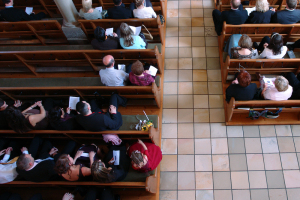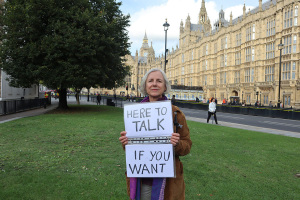Ever Hear of the First Amendment? An Argument to Watch
There it was, plain as day. Monday’s edition of USA Today included an opinion column by a Muslim woman that argued–quite straightforwardly–that the United States government should force a nondiscrimination policy on gender in all places of worship.
Asra Q. Nomani, a former reporter for The Wall Street Journal, argues that the Internal Revenue Service should move to deny tax-exempt status to any place of worship that holds to different roles for men and women. In “End Gender Apartheid in U.S. Mosques,” Nomani writes, “I’ve come to the difficult decision that women must use the legal system to restore rights in places of worship…”
Nomani writes out of her own experience as a Muslim woman in the United States. As she relates in her article, she has joined with a movement that has launched “Pray Ins” at several mosques in the Washington, D.C. area, protesting the practice of separating Muslim men and women for prayers.
She writes:
“Today, half the population of the Muslim world is discriminated against in most mosques. In a 2001 report titled the Mosque Study Project, national Muslim organizations found that in 1994, 52% of mosques reported women had to pray behind a partition or in another room, and in 2000, the number was 66%. In addition, on average, 75% of regular participants at mosques were men, making them true men’s clubs.”
This may very well be the case, but Nomani is not calling for change from within Islam, but for action by the government of the United States.
I am a Christian, not a Muslim, and it is not my purpose or responsibility to explain the theological basis for the gender practices and policies of Muslim mosques. But Nomani’s argument is a direct threat to religious liberty itself, not just to the teachings and practices of American Muslims.
She cites the 1982 U.S. Supreme Court decision related to Bob Jones University and the 1984 ruling on the Jaycees to argue that religious organizations should not be allowed to discriminate on the basis of gender. Those cases set precedents, of course, but they do not support her call for Federal action against mosques, churches, and synagogues. The Bob Jones case, handed down by the Court in support of the IRS, set a most dangerous precedent indeed. To the embarrassment of Christians, that case concerned discrimination on the basis of race - something the New Testament itself condemns. Nevertheless, the threat to all religious educational institutions yet remains in the wake of that ruling.
But Nomani’s call for action goes far beyond these precedents. In her words:
“I understand the difficulties in having the state intervene in worship issues. I believe in a separation of church and state, but I’ve come to the difficult decision that women must use the legal system to restore rights in places of worship, particularly when intimidation is used to enforce unfair rules.”
That is an almost comically irrational paragraph, and yet it ran in a column published in none other than USA Today. Nomani says that she “understand[s] the difficulties in having the state intervene in worship issues,” but shows no such understanding at all. Then, she writes that she “believe[s] in a separation of church and state,” but then she calls upon the coercive power of the state to force doctrinal change in places of worship. She cannot have it both ways.
The most amazing fact of all is not what is present in Nomani’s column, but what is absent. There is no reference at all to the First Amendment of the U.S. Constitution - not one word. The First Amendment includes the crucial wording that “Congress shall make no law respecting an establishment of religion, or prohibiting the free exercise thereof.”
All three of the world’s monotheistic religions teach that men and women have different and distinct roles. The vast majority of Muslims around the world believe this, as do Orthodox Jews and the denominations that include the vast majority of the world’s Christian population. Each, in its own way, explains its own practices and beliefs in terms of its own theological convictions.
The First Amendment of the U.S. Constitution expressly forbids the Federal government from (among other things) dictating theology to the nation’s religious bodies.
I am not worried that IRS agents are about to descend on the nation’s churches, mosques, and synagogues to force a new government-endorsed theology on our places of worship. I am very concerned, however, that this kind of argument, left unaddressed, implies a power that the government does not and should not possess.
More than that, I can only wonder how an article addressing religious liberty concerns can be passed for publication in a national newspaper like USA Today while failing even to mention the First Amendment. Of course, Christians do not ground religious liberty in the U.S. Constitution, but in the fact that every single human being bears the image of God. Nevertheless, Americans enshrine and protect that liberty by the means of our national charter of liberties. No serious argument about matters of religious freedom in the United States can be made without reference to that charter and its First Amendment.
Asra Nomani just called for the IRS to dictate theology to the nation’s churches, synagogues, and mosques. It was published in plain view in USA Today. Did anyone notice what was missing?





























